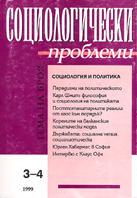Защо социализмът премахна частната собственост, но не стоково паричните отношения?
Why Does Socialism Abolish Private Property, but not the Circulation of Goods and Money?
Author(s): Vassil PenchevSubject(s): Social Sciences
Published by: Институт по философия и социология при БАН
Summary/Abstract: In a previous article I considered the socialistic economic system as an extreme variant of a modern economic system. The ideal type of socialist state resembles a gigantic modern enterprise. This explains why private property was abolished. But why not the circulation of goods and money? In seeking the answer the author studies the evolution of Lenin’s and Stalin’s views on the subject. The circulation of goods and money, although it contradicts the letter of Marxism, turns out to be an irreplaceable means of „socialist accumulation“. The retaining of circulation may be successfully accounted for theoretically by the proposed hypothesis: „Socialism is the Orthodox variant of modernization“. Circulation of goods and money remains in force because it serves the aim of autocratic modernization. Hence circulation ceases to be of the „market“ type and is transformed into a „planned“ kind. In this way the Western system of free entrepreneurship is adapted to the Orthodox-autocratic civilization for the purpose of modernizing Russia in the form of socialism. In fact Marxism serves as a mediator between Western and Orthodox civilization, enabling the modernization of Russia.
Journal: Социологически проблеми
- Issue Year: 31/1999
- Issue No: 3+4
- Page Range: 196-211
- Page Count: 16
- Language: Bulgarian
- Content File-PDF

